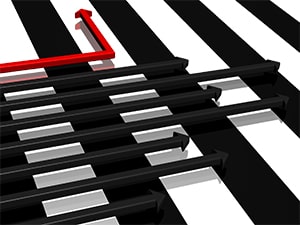Non-Retroactivity of the Law
“No Law shall be construed Retroactive unless manifestly intended by law.”
The Law and The Time
 Imagine a case where a person has committed a criminal offense, and now that person is standing trial for such offense. However, during the relevant proceedings, the legislature has decided that the penalty clause for the crime he/she committed is too severe and they have reduced it. How is the question answered as to which penalty clause applies? At the time of the undertaking of the offense, the guilty party committed the crime with the knowledge of the more severe punishment. Should such party be provided with the application of the more lenient sentence?
Imagine a case where a person has committed a criminal offense, and now that person is standing trial for such offense. However, during the relevant proceedings, the legislature has decided that the penalty clause for the crime he/she committed is too severe and they have reduced it. How is the question answered as to which penalty clause applies? At the time of the undertaking of the offense, the guilty party committed the crime with the knowledge of the more severe punishment. Should such party be provided with the application of the more lenient sentence?
In criminal law, the provisions of the law have substantial repercussions on all parties involved in criminal law proceedings. Mitigating and aggravating factors can only go so far as to harshen or lessen a sentence, but the provisions of the law ultimately control what the outcome of the proceedings will be. The question arising in this situation is whether or not the criminal law should apply retrospectively during the processes of criminal trials for crimes perpetrated before the commencement of the law.
Non-retroactivity in Action
A landmark case globally occurred here is the South African case of the S v Makwanyane and Another 1994 (3) SA 868 (A), the accused in this case had been convicted in a Divisional Supreme Court on four counts of murder, one count of attempted murder and one count of robbery with aggravating circumstances. When the crimes the convict supposedly committed had occurred, the death penalty was still in use in the country under Section 277(1)(a) of the Criminal Procedure Act Number 51 of 1977 (the Criminal Law) which stated that the death penalty is a competent sentence for murder. During the initial trial, the death penalty was still an appropriate sentence to be handed down. However, when the time came for the implementation of the verdict, the Republic of South Africa Constitution had been promulgated, regarding this law, section 9 and 11(2) brought into question the constitutionality of the death penalty. This case moved all the way up to the highest court in the country, the Constitutional Court, and ultimately the provisions of the Constitution applied retrospectively to declare the death penalty unconstitutional and in violation of their human rights provided in the Constitution.
The application of the Rule of Non-Retroactivity of the penal code has prevalence in the applicability of criminal rule as to time.
Constitution of the UAE
Article (27) of the UAE Constitution rules that a person may not receive punishment for an act or omission of an act committed before the relevant law becomes promulgated. Regarding this provision, it provided that a person within the UAE cannot be charged retrospectively for an act or omission committed in the past that was not a crime previously but has now become a crime. Regarding this provision, the person who has performed the act or omission would not have had the criminal intent while committing such since, at the time, it was not yet a crime.
UAE Penal Law:
A crime shall be sanctioned according to the law in force at the time of its perpetration. Determining this law shall occur at the completion time of the execution regardless of the realization time of the result. This piece of legislation provides that the law in force when a crime has been committed is the law that will preside over that crime – this piece of legislation, in fact, made the retrospective application of new law impossible. However, as is to be discussed, the law has provided for exceptions to this rule to ensure fairness in all criminal proceedings. The next Article offers for such exceptions to the retrospective application of the law.
"If a law that is more favorable to the accused is enacted after the perpetration of a crime and before rendering a final judgment, it shall exclusively be applied. If the law is enacted after rendering a final judgment, that makes an act or omission committed by a convict not punishable, the judgment shall not remain unimplemented, and its penal consequences shall no longer exist, unless the new law provides otherwise. Should the new law provide only for justification of the penalty, the court that rendered the last judgment may, at the request of the public prosecution of the convict, review the sentence under the scope of the new law.”
A case that demonstrated an exception was Dubai Court of Cassation, 284/2009. Within it is stated that, while generally using laws in retrospect is impermissible, there is one situation where it may. This condition would be in the case of time bars since a time bar for a situation occurring before a law change will still not have been reached after the turn of legislation, and so the new time bar will be applied to the agreement even in retrospect.
 Except for the provisions of the preceding section, if a law has been enacted making an act or omission a criminal offense or exacerbating the prescribed penalty to it and provided that such legislation has been passed temporarily for a short period or under fortuitous events, the following shall be the case. The expiration of the period specified for its effectiveness or the disappearance of the fortuitous circumstances shall neither debar the prosecution of crimes perpetrated during such a period nor shall it preclude the enforcement of a penalty imposed under such law.
Except for the provisions of the preceding section, if a law has been enacted making an act or omission a criminal offense or exacerbating the prescribed penalty to it and provided that such legislation has been passed temporarily for a short period or under fortuitous events, the following shall be the case. The expiration of the period specified for its effectiveness or the disappearance of the fortuitous circumstances shall neither debar the prosecution of crimes perpetrated during such a period nor shall it preclude the enforcement of a penalty imposed under such law.
The new law shall apply to any continuous or successive crimes perpetrated before its coming into effect or crimes which repeatedly reoccur during the active period of this law.
This concept was further solidified and confirmed in a custody case in which two separated parents reached a deal. They agreed that their child would remain in the custody of the mother until she reached the age of seven. However, when the time came about, she refused to pass the child on to the father. The reason she chose to do this was due to the simple fact that since they had first reached their agreement, new laws had come into place which stated that, the child should stay in the custody of the mother till the age of 11 for a boy and 13 for a girl. In the court of the first instance, the judge agreed with the mother and stated that the child would remain with her. However, the father appealed this and in both the court of appeal and court of cassation, the decision was reversed due to the laws being non-retrospective
Where the new bill amends the provision concerning the tendency of a criminal offender to re-offend or a plurality of crimes or penalties, it shall apply to any offense that subjects the accused to requirements of a majority or according to which he becomes a recidivist even if the other crimes have occurred before its application.
Retro-Scenario
The UAE Constitution as well as provisions in the Penal Code not only provides that penal provisions are not retroactive but ensures that the only one exception to this rule is the retrospective application in situations in which the criminal requirements are more favorable to the accused. The exemption does not appear as objectionable as a rule. There are many reasons for the mitigation of penalties as it is not in line with justiciability to place a more severe sentence than is necessary or required by the law in the name of social defense. If therefore, a lighter penalty is thought sufficient for the future, to make it applicable to offenses committed in the past, but upon which sentence has not yet passed, is not unreasonable.
There have been problems previously in deciding which law is more favorable to the accused. There are various criteria to use to determine which legislation is more desirable and which law should be applied. It is thought by some jurists that where there is doubt regarding which code to use, the difference in maximal should be the determining factor, but that in fact, a low minimum penalty is far more favorable to the accused than a small maximum. In the opinion of Professor Ramsis Behnam, “the solution depends upon the interest of each delinquent in each case, especially concerning the application of punishment.”
Conclusion
 Interpretation of the phrase "law in force" in the Penal Code must be concerning the provision of the constitution. Laws begin execution throughout the United Arab Emirates from the time when promulgation becomes known, and it must be taken to be known thirty days after publication.
Interpretation of the phrase "law in force" in the Penal Code must be concerning the provision of the constitution. Laws begin execution throughout the United Arab Emirates from the time when promulgation becomes known, and it must be taken to be known thirty days after publication.
Article 13 of the Penal Code does, in fact, limit the exception contained in its provision to offenses which have not been subjected to final judgment before the new law came into force. However, this provision states that where there is a final judgment, and the new law is such that the act or omission no longer constitutes a criminal offense, then such decision shall not be implemented at all, and its penal effects shall cease to exist; this is only the case where the new law does not provide otherwise. Where a provision offers just for the explanation of a sentence, for the review of a final judgment given before such laws promulgation, the convicted person or the public prosecution must produce an application.
In cases where the new law completely removes the criminal element of an act or omission, it would be unjustifiable for a judicial system to continue to punish persons who have previously committed such acts. However, one must take notice of the intention of the accused, those persons who already committed such acts, knowing they were committing an offense as per the law at the time of commission, will be of a guilty mind and thus will still have criminal intent. One needs to consider whether criminal intent is a factor in determining with retro-application of extenuating new criminal law. A person who had the mental capacity to commit an act or omission, knowing that such act or omission constituted a crime does not have the psychological ability revoked just because the crime previously committed is no longer a crime.
An additional question that arises when applying alterations to laws would be alterations to the requirements of the procedure. It provides that the accused has no right save that of proving their innocence. Presumably, the new rules perform better for this purpose than the previous ones. In any case, they can have no acquired right against the manifestation of the truth.
 English
English
 عربي
عربي Русский
Русский 官话
官话 português
português
 Türk
Türk 










